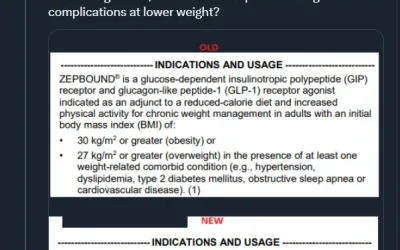Your Complete Guide to Healthy and Sustainable Weight Loss

Clinical Review Provided By: Laure DeMattia, DO; Stephanie Garcia, MS, RDN
Losing unwanted weight is a common goal for many people, but achieving it can often be a long journey with confusing, conflicting advice.
Obesity is a complex disease, and there’s no single, easy solution to address it. Unfortunately, it’s all too common to see exploitative companies taking advantage of the fact that so many people want to lose weight. Fad diets, “miracle” weight loss products and extreme workout plans too often lead to disappointment. Rapid weight loss can even pose health risks.
Healthy weight loss prioritizes the quality of your health over the number on the scale. By working on your well-being and improving all aspects of your life, you can start to see lasting results.
In this guide, you’ll learn more about what healthy weight loss and management looks like, as well as how you can make the practical changes necessary to achieve your goals.
What is Healthy Weight Loss?
Healthy weight loss is not about losing a lot of weight quickly or achieving a certain number on the scale by a certain date. Instead, it focuses on understanding the root causes of obesity as a disease and how to make comprehensive changes in your daily life that enable you to lose weight in a sustainable way.
Losing weight gradually and not focusing on “quick fixes” also allows your body to adjust to the change. It reduces the risk of losing muscle mass or experiencing dangerous nutritional deficiencies, both of which can be dangerous to your long-term health.
The Problem with Numbers
Obesity as a disease has been misunderstood for years. Many clinicians rely too heavily on BMI and other tools rather than using it in conjunction with other practical, evidence-based methods.
BMI, though flawed, is still widely used by medical professionals today. While it can be useful in providing patients with a benchmark, it does not give a full picture of a person’s health. It only takes into account an individual’s height and weight and fails to consider an individual’s body type (composition), age, sex, race, and bone structure, among many other variables.
In 2023, the American Medical Association released a report suggesting that BMI should not be used as the sole indicator of an individual’s health, and that it is best used in conjunction with other methods when diagnosing and treating obesity.
A Well-Rounded Approach: The Four Pillars of Well-Being
Healthy weight loss isn’t just about eating certain foods or committing to a daily exercise routine. It’s about making comprehensive changes to your whole life that you can sustain for the long term.
Weight loss touches all areas of your health, which can be categorized broadly into four pillars of well-being: nutrition, movement, sleep and mental health. All four pillars are all equally important to your health, and improving these areas of your life can help you lose weight sustainably and achieve your health goals.
1. Nutrition
Balanced, nutritious meals made with whole foods are a cornerstone of any effective, sustainable weight loss plan. You can eat food that tastes good without feeling like you’re depriving yourself.
Unfortunately, the allure of fad diets often gets in the way. While they boast “amazing” and “immediate” weight loss results, most are highly restrictive, eliminating entire food groups. Some also encourage eating highly processed foods under their own branding. Needless to say, fad diets are not a sustainable, long-term solution for most people and often lead to regained weight later on.
2. Movement
Physical activity is another key component to staying healthy. Movement contributes to your overall health and helps you burn calories, build up muscle and boost your metabolism.
Many people trying to lose weight go immediately to vigorous cardio exercises. Running, stair climbing and jumping rope are all effective at getting your heart rate up. But while cardio routines can help you shed pounds, it might not result in the weight loss you expect. Your body may end up breaking down muscle tissue as a source of energy instead of burning fat mass.
3. Sleep
62% of adults feel that they don’t get enough sleep. With phones, social media, family, friends and work all demanding your attention, it’s tempting to forgo a few hours of sleep to get everything done.
Lack of sleep is a hidden contributor to weight gain in many patients. Sleep regulates your entire body, including your metabolism and hormones. A long-term lack of sleep can have a serious impact on your well-being and can contribute to obesity, diabetes, heart disease and other serious health problems.
As you sleep, your body releases hormones that help regulate your body’s systems. A lack of sleep can result in:
-
Increased cortisol, a hormone associated with stress
-
Increased insulin, a hormone linked with weight gain and diabetes
-
Increased ghrelin, a hormone that stimulates appetite and higher hunger signals
-
Decreased leptin, a hormone that helps people feel satiated after eating
4. Well-Being
Weight loss isn’t just about how your body looks physically. It’s also deeply tied to your mental well-being and how you feel. For many people who have been dealing with obesity for a long time, this could mean rewiring your brain from years of negative self-talk.
Learning to practice self-compassion and manage stress effectively can help you stick to your weight loss plan for the long run. This can look different for different people and may include:
-
Meditating, stretching or practicing deep breathing
-
Getting regular physical activity
-
Socializing and spending time with loved ones
-
Talking with a therapist
-
Prioritizing tasks and learning to say no
-
Engaging in activities that make you feel happy and relaxed
Working with Healthcare Professionals
Many people work hard to stick to diets or exercise regimens, only to not achieve their weight loss goals. Over 80% of people with obesity believe that it is completely their responsibility to manage their own weight loss.
You don’t have to go at it alone. If you’re looking to find a healthy weight loss solution that really works, it may be time to seek the guidance of professionals.
By working with a registered dietitian and other health care providers who specialize in obesity management, you can work to develop a personalized plan that addresses your specific needs, health conditions and goals.
Final Word
Healthy weight loss isn’t just about achieving a lower number on the scale or looking a certain way. It’s about setting long-term goals and incorporating well-rounded solutions into your daily routine.
By eating nutrient-rich foods, practicing resistance training, getting enough sleep and improving your mental well-being, you can achieve long-term weight loss results and better health for years to come.
Ready to start your journey to better health? Schedule a consultation with Accomplish Health today!
Disclaimer: This blog post is for informational purposes only and should not be considered medical advice. Please consult with a qualified healthcare professional before starting any weight management program.
References
-
About sleep. U.S. Center for Disease Control. May 15, 2024. Read More
-
AMA adopts new policy clarifying role of BMI as a measure in medicine. June 14, 2023. Read More
-
Ballor DL, et al. Resistance weight training during caloric restriction enhances lean body weight maintenance. Am J Clin Nutr. February 1988. Read More
Stay in the loop.
"*" indicates required fields
Interested in becoming a patient?



